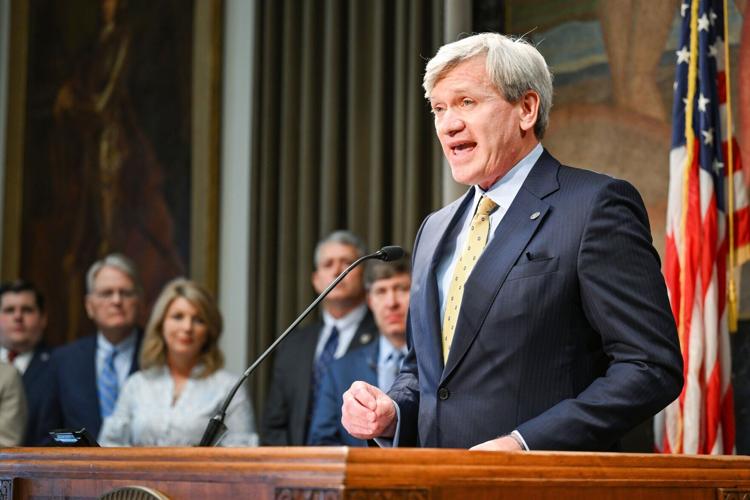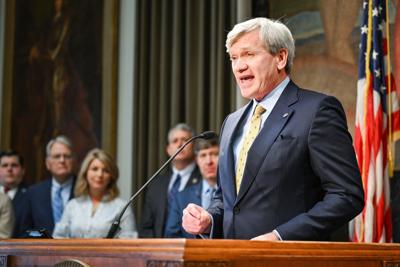Tim Temple became Louisiana’s insurance commissioner in January after he won election, but not the sort in which the voters spoke.
Temple’s lone competitor dropped out, so the Republican industry insider got the job without having to sell his proposal to solve the state’s property insurance crisis, which leans heavily on loosening regulation and reducing litigation. He contends that what’s good for insurers, unpopular though they may be, is ultimately good for consumers because it will attract companies into the market, create competition and eventually bring down prices.
When voters finally did get a say — just as Temple’s plan was moving through the Legislature — they were skeptical, to put it mildly. In a poll for The Times-Picayune | The Advocate in April, just 25% agreed with his approach, while 68% didn’t. That had to hurt.
Since the poll came out, though, something interesting has happened.
Temple insists he’s always understood the existential threat that massive premiums pose to people who can’t absorb the extra cost, and he hasn’t wavered from his argument that competition and choice are the best forms of consumer protection.

Columnist Stephanie Grace
But it’s hard to miss something of a pivot in his tone, a little less ‘We all have to take our medicine’ and a little more ‘I feel your pain.’
I spoke with Temple twice last week, once in an online town hall and once in a meeting with the paper’s editorial board. Both times, he defended now-adopted policies such as phasing out a rule that kept insurers from dropping long-standing customers and giving them more flexibility in pricing. He said the approach is starting to bear fruit, with one company having filed an application to enter Louisiana’s market and another exploring it.
But Temple also zeroed in on a number of measures that could give consumers at least some relief in the shorter term.
One is legislation authored by state Sen. Kirk Talbot, R-River Ridge, and passed with Temple’s support, to temporarily waive the 10% surcharge tacked onto policies with Citizens, the state’s insurer of last resort. The idea behind the surcharge is to keep Citizens from offering a more appealing product than the private market, but the legislation acknowledges the reality that many customers now have no private options.
Temple had actually opposed an earlier similar proposal by state Rep. Matthew Willard, D-New Orleans. He said last week that he backed the Talbot approach because it had other provisions to reduce litigation expenses for Citizens. Still, a main reason his top aide had given for opposing Willard bill's was that “We do not want to encourage people to stay in Citizens” — as if those people were doing something wrong rather than doing the best they could.
In the town hall, Temple said he was open to some other ideas to help customers through this difficult stretch. He said that while it’s impractical for the state to cover the cost of inspections required to get state grants for fortified roofs, he understands that the upfront cost might be prohibitive for some applicants and talked of working with NGOs on a program to help.
He said he could envision backing some sort of tax break, perhaps waiving a tax on premiums that he said is second highest in the nation. He noted that this would take legislative action at a time when the state is heading toward a fiscal cliff, but said he’s had some preliminary conversations on the subject.
In addition, Temple said his office plans to more aggressively publicize some options currently available to strapped homeowners. One is that customers can hire independent inspectors to assess their homes’ storm readiness and use the results to request lower premiums. Another is that they can explore lowering overall premiums by splitting up policies, with Citizens covering wind damage and a private company insuring for other hazards such as fire.
Temple also plans to keep pushing for more fortified roofs and hopes to find a way for industry, not taxpayers, to pay for state grants. He noted that there’s a state tax credit available to people who add fortified roofs without grants, which would also qualify them for premium discounts (although Temple opposed legislation to specify a 20% discount benchmark like the one in Alabama law, preferring to rely on the free market to price it appropriately).
He even seems to be backing off the idea that getting people off Citizens as soon as possible is a top priority. Asked about the lower storm deductible offered by Citizens compared to many private policies — which definitely makes it a more attractive product for consumers — he said he wants to know more about it but didn't say it should be changed.
I asked whether all this represents a change in outlook since the poll came out, or perhaps since hearing so many people’s stories in his travels, and Temple chose to stick to policy matters. Fair enough.
So I’m just going to say what I think happened: that Temple got the message of widespread distress and frustration, is taking it to heart and looking for ways to incorporate it into his industry-focused world view.
And I’m also going to say that I’m glad to hear it.



